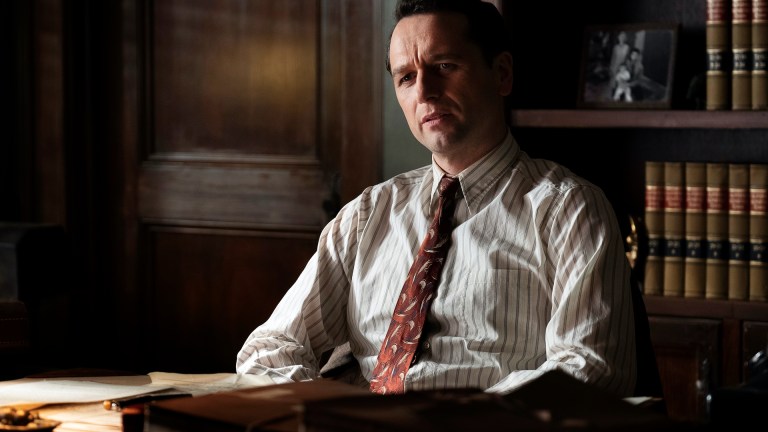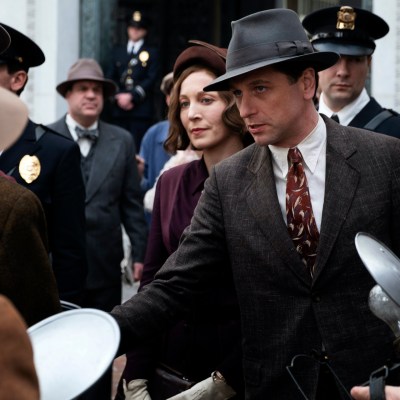Perry Mason Ending Explained
Emily Dodson isn't acquitted, but gets off. What is reasonable doubt and why do we believe Perry Mason will continue to appeal?

This Perry Mason season 1 finale piece contains spoilers by legal definition.
Perry Mason made its closing arguments for season 1. While the jury was deadlocked on whether Emily Dodson (Gayle Rankin) murdered her own baby, Charlie, or not, the verdict was a triumph for the defense attorney and the series named after him. A hung jury may not be a clear win, but it is a victory. It means Perry Mason’s (Matthew Rhys) first case was not a full on winner. Mason made mistakes. He is learning, probably to make more mistakes, but his education will turn him into legal legend. If the series closed its opening with a decisive win, it would have been a cheat.
Not that Mason is above cheating. That is evident in how he sets Peter Strickland (Shea Whigham) off on a job to bribe a juror. He didn’t have to do it. Two other jurors were swayed by Mason’s presentation in court. He started off coughing and mumbling, but he wrapped it up with an emotional call to arms for the jury. He asked for bravery, which in this case meant being strong enough to look past the obvious sins and stolen temptations the god-fearing suspect brought to trial and still put truth before justice. Mason proved to at least two, and paid for one, to accept that one had nothing to do with the other and cast their vote with the damaged woman on the stand. It is not a win. It is reasonable doubt. While it is more than imaginary doubt, there is no moral certainty of the existence of guilt.
Emily is a free woman now, in spite of the promises District Attorney Maynard Barnes (Stephen Root) made to retry her case. Besides the historical fact that most cases don’t do well the second time they come before a court, we know this because Barnes verbally, and almost physically, attacked a reporter who insinuated he’d lost the case. Barnes is the master of insinuation and for him to be outdone by a stringer on a concrete step is a death sentence for his character, something he couldn’t sell to a jury about the accused. His outburst also signifies this is the end of his run for Mayor and his tenure in the District Attorney’s office.
Barnes’ place will be taken by Hamilton Burger (Justin Kirk) in the upcoming season, and Burger is going to be Mason’s legal nemesis. He’s got Strickland doing his detective work for him and this means next season is going to be fun. Strickland ate Mason’s shit for six episodes and was still picking his teeth when he bribed the juror, so having him back up the guy who will go toe-to-toe with Mason will bring in a new game. Competition works wonders in shows like this. The very last we see of Strickland, Burger is grilling him on the stand about all the dirt he found against the Assembly of God Church. We don’t know the verdict, but we can guess some of the elders will be growing very old in jail.
Emily is sentenced to live and take care of another new life and new testament in the Book of Sister Alice (Tatiana Maslany). When Emily accepts the baby she knows is not hers as her own, it means she is a lifelong victim of circumstance. When she cradles the baby in public at the Church of the Newborn, it means Birdy McKeegan (Lili Taylor) is a ruthless evangelical voice. It begs at least one question. Where did the baby come from? Was some infant stolen, bought or otherwise purloined from some unfortunate mother? Charlie Dodson had been kidnapped, was his replacement found in some overnight delivery bin at some local orphanage or left in a basket in the bulrushes like Moses? Birdy McKeegan certainly makes a grand exodus on her journey into religious fraudulence.
Sister Alice truly believed she worked for God, even as she had some idea it was all a self-deluded illusion. Tatiana Maslany has been a joy to watch, dipping into Alice’s memories and fears for a vibrant and active characterization. While we probably won’t see her in season 2, her line about being lonely implies we may not have seen the last of her. Perhaps she’ll fill the romantic need Lupe Gibbs (Veronica Falcón) provided while Mason lived on her terrain. Those two may continue their on again and off the ropes grappling in season 2, but it will probably be cut down to very infrequent visits. If the series is anything like the Erle Stanley Gardner’s books, Mason’s going to have to get an apartment upstairs from the office to keep up with the cases he’ll be seeing.
The ending means we won’t be seeing much of Perry Mason the detective, something District Attorney Hamilton Burger notes in the book series. While we can be sure he will be on each case from investigation to litigation, he has a more than suitable proxy. Former Officer Drake turned in his badge to take this job. That means he is free to mess with bad cops on the clock. Drake had an eventful arc. He dipped a toe in corruption and came up clean. Drake is truly angry the second the second time he meets Perry Mason and beats the shit out of him on the street like a dog. He is also already anguished. He knows he’s doing the wrong thing at the right time. The guy searching for the truth hurled an ugly opening salvo and deserved the beat-down for it, but Drake knows the importance of truth. He’s not going to get it while he’s wearing a uniform. He’s getting scammed by his superiors, taking in short-term cash to bury a long-term problem. He’s getting bullied, hassled and manipulated and Chris Chalk doesn’t let a thing get by him.
As Drake, Chalk has to walk a fine line between what is revealed and what is kept under wraps. The actor’s eyes accuse his superiors for the benefit of the audience, while escaping detection by the detectives accused. He doesn’t reserve this merely for fellow cops. He gives a disappointed glare at his wife, a whole series of reactions to what he sees as Mason’s antics and a strong gleam of support for Della Street. Mason’s confidential secretary, associate and someday partner groomed the attorney while he wasn’t looking and Juliet Rylance brings a calm assuredness to the role. Everything about her portrayal is understated. She is not only the smartest person in the room but the strongest. Both Drake and Street were introduced in Gardner’s first Mason novel, The Case of the Velvet Claws, from 1933.
The death of Detective Ennis means we will be losing one of the most interesting characters on the series. This guy was complicated, to say the least, and yet, very simple. He could have been one of the great villains of cable TV, and we are robbed of his further exploits. This was a bad, bad cop, who kept getting worse. He was sentenced to death by his own partner. The District Attorney wouldn’t even put him on the stand. Ennis never gets to excuse, redeem or even explain his actions. Mason will never get to face off against him and he is quite the nemesis. Because we won’t be seeing him again next year, Andrew Howard should be commended on a bad job, well done. Not only did he bring a nuanced maniac to life, he captured the series’ time period in a way no other actor could.
Ennis is a 1930s hard ass. He could have been played by Barton MacLane, though he evokes the actor Joseph Sawyer. Howard captures not only the timing of the patter, but the old-school method of acting as laid out by James Cagney: Look the other guy in the eye and say your lines. But mean them. When Ennis tosses off his snide asides on Mason’s imagined stand, eviscerating Mrs. Dodson, he is fully 1932 American. Howard is Welsh, or maybe another foreigner taking American jobs, his character might say. Ennis busted heads to keep the U.S. safe from commies. Howard also played on a 2013 episode of NBC’s short-lived Ironside remake. It seems he can’t get away from the shadow of Raymond Burr.
Perry Mason has already distinguished itself from the series which ran on CBS starting in 1957. It did it by dipping further into the novel series to get to the root of what makes Mason tick. HBO’s series isn’t absolutely hardcore about being a faithful adaptation. The iconic series and later novels mention Mason served on a Navy minesweeper during World War II. The HBO series places Mason in the trenches of World War I, where he got a “blue ticket” discharge. It is implied early that he got this for some sexual scandal, but we learn he killed wounded members of his own squad to spare them a horrific death by poison gas and flamethrower.
The ending scene, where Mason and his team are assembled and taking on their first client, means this particular trio will continue to go after the least winnable cases. The woman walks in and says she’s in trouble. Everything about her looks troublesome, except the retainer which she can pay upfront. Whatever her crime, the trial sequences which get her off will be very engaging. Television law is a game of chess, sometimes the defense is on top, but usually the prosecution is in charge. The ending of Perry Mason means the balance will be tipped.

